Coordination
Background
Effective coordination can prevent gaps and overlaps in humanitarian responses, ensure the impact of CVA is optimised for the benefit of crisis affected populations, whilst also making the most of limited humanitarian funding. But the CALP Network’s State of the World’s Cash report found that cash coordination is seen as weak and ad hoc, and that this is having serious operational impact.
Ninety-five donors, international and national NGOs, private sector actors and one UN agency have called for clarity on two key issues surrounding cash coordination:
- Who should be accountable for ensuring effective cash coordination, and
- What the scope of Cash Working Groups should be, including in relation to multipurpose cash.
We urgently need to build on what works and provide clarity at the global level on the questions above, whilst adapting to different contexts. Clear decisions based on the impact on affected populations rather than agency politics are long overdue.
Current priorities
We aim to contribute to progress on this issue on three levels: supporting Cash Working Groups at the regional level; contributing to practical solutions for cash coordination at the global level; and convening evidence-based discussion on the key issues, highlighting critical decision points and opportunities for progress.
Featured content

Cash Coordination – LIVE timeline
Page
The latest updates on cash coordination as they unfold.

95 Organisations Sign Letter Calling for Strengthened Cash Coordination
News
Today a letter signed by 95 organisations was handed into the Emergency Relief Coordinator (ERC) urging the Inter-Agency Standing Committee (IASC) to take a decision on the leadership and scope of cash coordination in the coming year.

Is cash transforming the humanitarian system or is the system limiting how cash is used?
Blog Post
At the State of World’s Cash 2020 launch event, Sorcha O’Callaghan, Director of Humanitarian Policy Group at ODI warned that, “Cash offers a huge transformative potential, but as far as the system is privileging the interest of the agencies over people in crisis, we won’t be able to see it”. If you missed the State of the World's Cash 2020 launch we're sharing highlights. Quote 4...
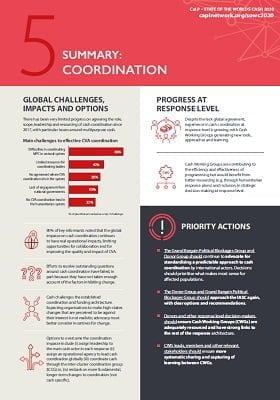
State of the World’s Cash 2020 Chapter 5 summary: Coordination
Report
There has been very limited progress on cash coordination since 2017. Cash continues to challenge the established coordination and funding architecture, and efforts to resolve outstanding questions around cash coordination have failed. Despite the lack of global agreement, Cash Working Groups are pushing forward and contributing to improved programming, and generating new approaches. This...

Cash Coordination Tip Sheet
Guidelines and Tools
This tip sheet sets out established best practice, key guidance and resources for all aspects of cash coordination, intended as a clear, accessible and action-oriented guide for those engaged in coordination of cash and voucher assistance (CVA) at the field level.

Introducing the Cash Coordination Tip Sheet
Webinar
The CALP Network has developed a tipsheet setting out established best practice and key guidance and resources for all aspects of cash coordination, intended as a clear, accessible and action-oriented guide for those engaged in coordination of cash and voucher assistance at the field level.

Cash Coordination: A proposal from members in MENA
Blog Post
Earlier this year the CALP Network undertook regional consultations to explore options for cash coordination. This blog lays out recommendations from participants from the Middle East and North Africa who sketched out what cash coordination, and coordination more broadly, could look like in future to support a more effective, efficient and accountable response.
Thematic lead
Latest
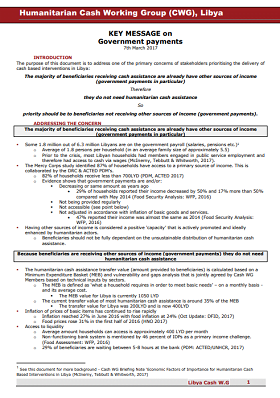
Libya Humanitarian Cash Working Group (CWG) Key Messages on Government Payments
Report
The purpose of this document is to address one of the primary concerns of stakeholders prioritising the delivery of cash based interventions in Libya:
The majority of beneficiaries receiving cash assistance are already have other sources of income (government payments in particular) Therefore they do not...
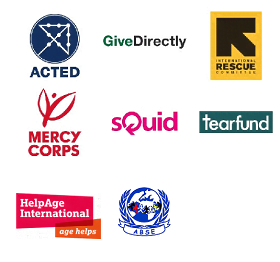
Press Release: Providing cash directly to those most in need is revolutionising the way we provide overseas aid to the world’s poorest people
Blog Post
London, United Kingdom – As the global partnership for cash transfer programming in humanitarian aid, the the CALP Network takes issue with recent criticisms of cash transfers made by Nigel Evans MP and in the media. Cash transfer programming is one of the most highly scrutinized forms of aid. The CALP...

Looking Back to Move Forward: Building on Learning from 2011 to Strengthen the 2017 Drought Response in Somalia Learning Report
Report
This report provides a summary of the discussions that took place during a half-day reflection workshop in May 2017. More than 40 people from national and international NGOs, the UN, donors and research organisations came together to consider lessons from the 2011 drought response, reflect on the use of...

Partnering with Mobile Network Operators in Zimbabwe to Deliver Cash Transfers
Report
This case study seeks to investigate and document the following: The process of engagement between MNOs and CARE. Clarity of roles between CARE/WVI as implementing agencies and MNOs. Successes and challenges in the partnership between CARE/WVI and the MNOs Measures taken to manage the impact of the...
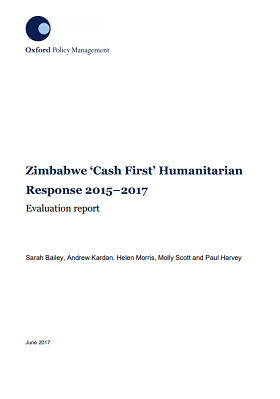
Zimbabwe ‘Cash First’ Humanitarian Response 2015–2017: Evaluation Report
Report
CARE International and World Vision International (WVI) in Zimbabwe implemented the UK Department for International Development (DFID)-funded project ‘Emergency Cash First Response to Drought-Affected Communities in the Southern Provinces of Zimbabwe’ from August 2015 to April 2017. The project...
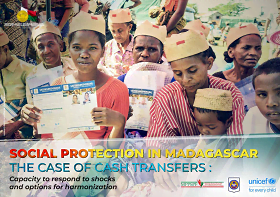
Social protection in Madagascar – The Case of Cash Transfers: Capacity to respond to shocks and options for harmonization
Report
The report has been prepared as commissioned by the Government of Madagascar (Ministry of Population, Social protection and Women’s Promotion and the National Office of Risk and Disaster Management) in coordination with the members of the emergency cash group and with UNICEF’s funding and technical...

Cash or in-kind? Why not both? Response Analysis Lessons from Multimodal Programming
Report
This research reviews lessons learned about response analysis from multimodal responses, that is, responses in which practitioners determined that more than one response modality between cash,vouchers, and in-kind, was a “best fit” or in which the conclusions about “best fit” changed over...
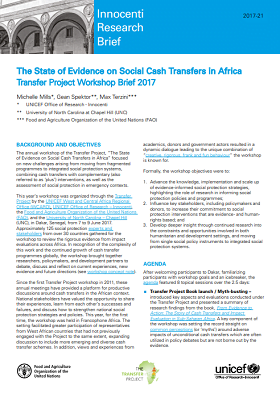
The State of Evidence on Social Cash Transfers in Africa. Transfer Project Workshop Brief 2017
Report
The annual workshop of the Transfer Project, “The State of Evidence on Social Cash Transfers in Africa” focused on new challenges arising from moving from fragmented programmes to integrated social protection systems, combining cash transfers with complementary (also referred to as ‘plus’)...
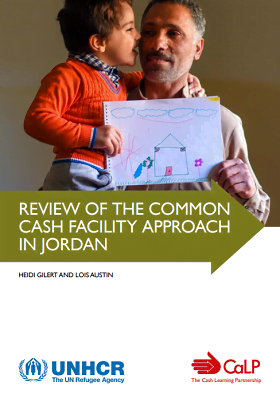
Review of the Common Cash Facility approach in Jordan
Report
The United Nations High Commissioner for Refugees (UNHCR) in Jordan has pioneered a collaborative, multi-stakeholder approach to the delivery of cash, known as the Common Cash Facility (CCF). The aim of the CCF is to provide humanitarian actors with direct and equal access to a common financial service...
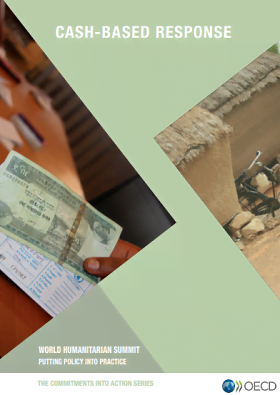
Cash-Based Response- OECD Commitments into Action Series
Report
The use of cash in humanitarian response is not new. What is new, notably after the World Humanitarian Summit and the Grand Bargain, is the policy momentum for using cash as a primary option in responding to humanitarian needs. There is a growing body of evidence demonstrating its multiple benefits as...

Cash transfer platforms in humanitarian contexts
Report
This report is based on ten days of desk-based research prepared for the Australian Government that aims to respond to the following questions: What is the rationale for using multi-purpose cash transfers and single platforms? What is driving donor agency positions on these issues? What is the evidence...

Time for Change: Harnessing the Potential of Humanitarian Cash Transfers
Report
This synthesis report examines the effectiveness of humanitarian cash transfers in Ukraine, Iraq, the Democratic Republic of the Congo (DRC), Mozambique and Nepal. These case studies are building on the work of the High Level Panel on Humanitarian Cash Transfers. The Panel concluded that cash transfers...
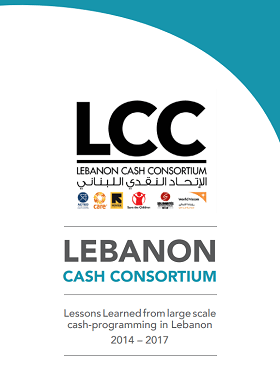
Lessons Learned from large scale cash programming in Lebanon 2014 – 2017
Report
Given the fact that cash is becoming an increasingly used modality in humanitarian
interventions, coupled with the evolution of the funding model for cash assistance in Lebanon, the former LCC agencies find it important to give to cash consortia and cash actors the benefit of the unique experience that...

Challenging the System: Humanitarian Cash Transfers in Iraq
Report
Cash transfers have been used in Iraq to meet the critical basic needs of a highly vulnerable population, providing them dignity and flexibility in a context of uncertainty and economic need. Although Iraq is an appropriate context for the use of cash transfers, factors including government acceptance,...

Humanitarian Cash Transfers in the Democratic Republic of Congo
Report
The Democratic Republic of Congo (DRC) is at a crossroads with regard to cash transfers. On the one hand, cash has been accepted by most donors and aid agencies as an appropriate response, with solid evidence underpinning its use. Aid agencies have driven important innovations in an environment where...

Madagascar Cash in Emergency Principles
Guidelines and Tools
To improve coordination at technical and strategic levels, an emergency cash group was formed in 2016 under the overall umbrella of the Social Protection Thematic Group which was co-led by UNICEF and the Ministry in charge of social protection. This has strengthened coordination amongst partners; improved...

A Review of Inter-Agency Collaboration for CTP Delivery
Report
Recent global initiatives have reaffirmed the potential for Cash-Transfer Programmes (CTP) to effectively and efficiently meet a wide range of disaster-affected populations’ needs while preserving dignity and choice. Although much work has been done in advocating for the benefits of CTP and enhancing...

Scaling up CTP in Somalia: A focus on: CTP options in a changing funding landscape and Improving the use of lesson learning
Report
This report summarises discussions that took place during a half-day event in November 2017. The event built on discussions in September during which a myriad of issues were highlighted and many opportunities for collective action noted. This meeting focused on a more in-depth discussion on two issues...

Responding to Drought in Kenya Using Cash and Vouchers: Learning from Previous Responses
Report
This paper provides a summary of 100 recommendations, lessons and observations from evaluations that have looked at the use of cash and vouchers in drought responses in Kenya. The reports which were reviewed considered the use of cash and vouchers in drought related responses in urban and rural areas;...
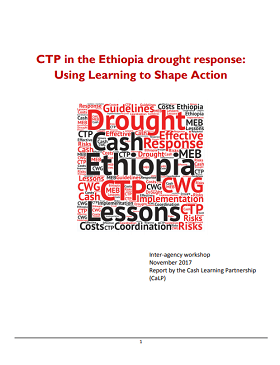
CTP in the Ethiopia Drought Response: Using Learning to Shape Action
Report
This workshop, convened by the CALP Network and the Ethiopia Cash Working Group, reflected on the use of cash transfers in the 2017 drought response. Key findings were: Cash helped address immediate needs and contributed to meeting some of the drought response objectives. There were significant...
